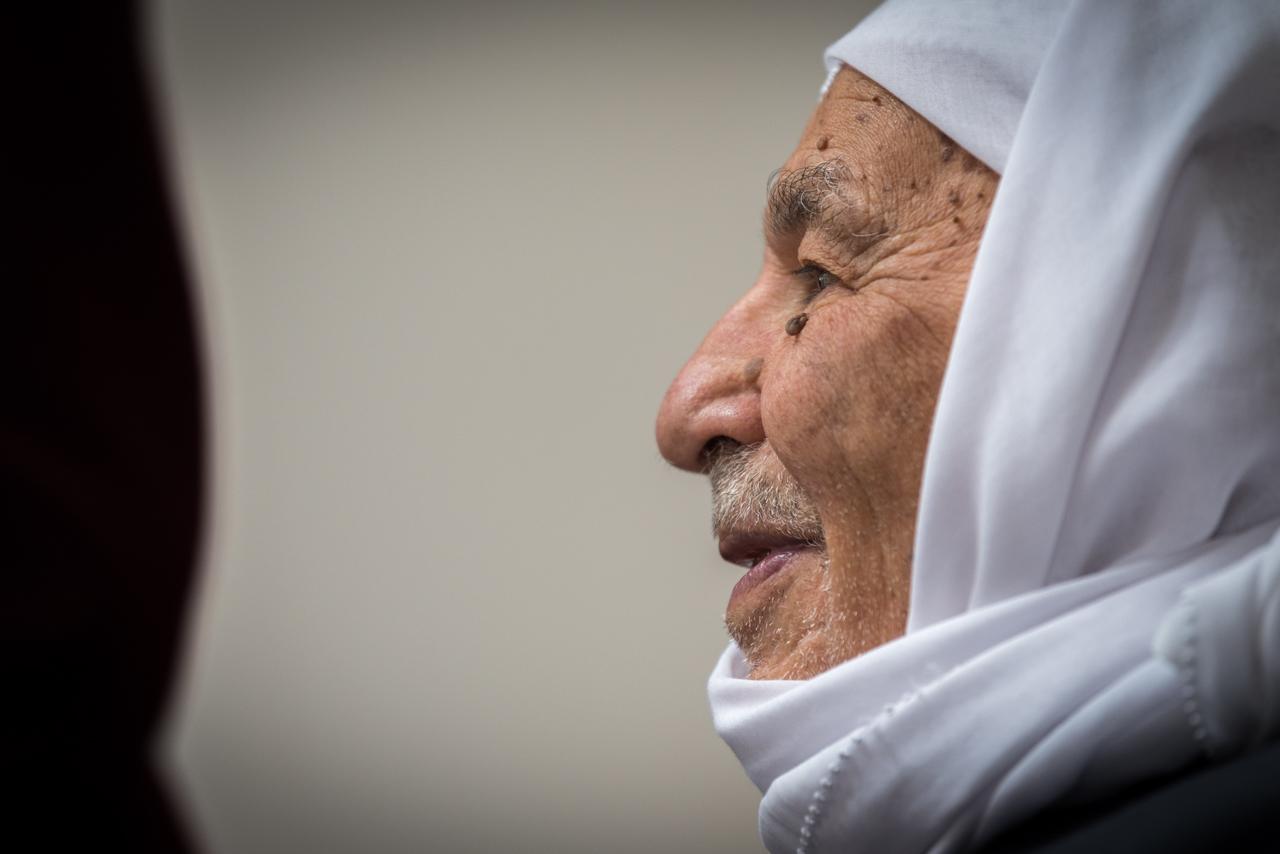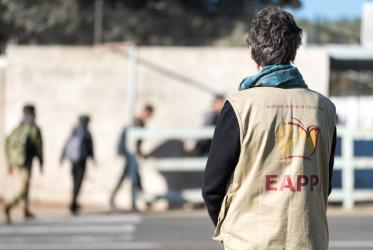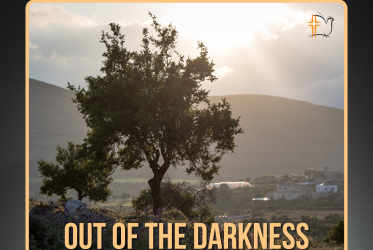By Albin Hillert*
Ma’alul, a Palestinian village destroyed in the 1948 Arab-Israeli war, saw a visit by ecumenical accompaniers in mid-March.
“I would have liked to invite you to a real home, not just as a refugee,” said Jad Saba Yusef Salem as he received the group of accompaniers to the village.
Today, 95-year-old Salem is one of few remaining survivors from the 75 families who used to live in the village back in 1948.
“My memory is not so good these days, but all the things I learnt in school, those I still remember,” Salem says jocularly, and moves on to tell the story of a community of some 800 people who used to cultivate the lands, growing wheat and corn, but also where apple trees used to abound.

A group of ecumenical accompaniers ascend the hill in Ma’alul. In 1948, apple trees used to grow here, as a source of food and income for the villagers of Ma’alul. Since the land was occupied, a pine tree forest has been planted to replace the fruit trees.
“There are two water wells in this area, one here and one over on the mountain,” Salem says. “Before 1948, we used to share them with our neighbouring Jewish communities. We were all friends.”
But peace in Ma’alul didn’t last. The land was occupied in 1948, and buildings razed to the ground.

The villagers in Ma’alul were mostly Palestinian Christians and Muslims, and the houses of worship still remain on the hilltop.
Today, what remains of the old village are two church buildings, a mosque and a Roman era mausoleum.

Cows graze on the hillside in Ma’alul. A Bedouin family has received permission to use the hill for their cattle, including the intermittent use of the old church structures as barns.
“The main incident before we decided we had to leave,” says Salem, “was a woman in our community standing by the door to her house, looking towards where the occupiers were. She was shot standing there. That’s when we realized, our neighbours are not our friends anymore.”
The villagers of Ma’alul didn’t go to one place, but sought refuge in nearby Nazareth, Jaffa, or moved to Syria or Lebanon.

“At first we thought it was temporary, for a few weeks, but in fact we were never able to return,” Salem says.
“The people of Ma’alul became displaced, they lost their lands, their homes, their work, with nothing to take its place,” says Diana Bisharat. A US-born 33-year-old, Bisharat married and moved to Israel in 2011, as a descendant of the villagers of Ma’alul.”

Diana Bisharat and Jad Saba Yusef Salem receive the ecumenical accompaniers in Ma’alul’s Catholic church building.
“Ma’alul was not just a village, it was a family,” Bisharat reflects. “And still today we remember, we stand tall. Every Easter, we get permission from the Israeli government, and we gather here as a community, to celebrate and have mass, and to reminisce together.”
“My wife and I married in June 1947,” Salem says in conclusion. “I am still healthy, and I love life. I can make my own breakfast, and we help each other with the housework. This is how I want to live life, to be strong, for nothing to stop me.”
The safety of a book
“Meeting with someone like Salem, I just want to talk longer. I have a hundred questions,” reflects one of the ecumenical accompaniers as the group leaves the village.
“I’m not sure I have the words to speak about the experience,” he adds, but continues after a minute. “As I left my previous job, I was looking for something new to do, and found this programme as something meaningful to be part of.”
The World Council of Churches (WCC) Ecumenical Accompaniment Programme in Israel and Palestine provides a continuous presence of 25-30 ecumenical accompaniers, who for three months accompany local communities, offering a protective presence, collecting documentation, and witnessing daily struggles and hopes.
“I was watching the Madrid peace talks in the early 1990s, on the news. It was on for 20-minutes a day, it was quite substantial coverage. And I developed an interest in this issue, I read books, from the comfort of my armchair,” the accompanier adds.
“Now it’s 2019, I’m here, and it’s not a book, it’s not one of a hundred pages in a book,” he continues. “The men and the women I see in the South Hebron Hills, where I am stationed. This guy. He’s 95 years old, and he is not a book.”

“Now it’s 2019, I’m here, and it’s not a book, it’s not one of a hundred pages in a book,” one of the accompaniers says.
He concludes, “visiting communities here, you become aware of the safety that there is in books. You read and you learn, but it’s… even with the worst things, books don’t make you cry. At least they don’t make me cry. But this does. This strong, old man, with that twinkle in his eyes.”
Ecumenical Accompaniment Programme in Palestine and Israel
Shabbat dinner ‘helps humanize two sides of the story’ (WCC press release of 27 March 2019)
EAs offer protective presence, night as well as day, as Khan al Ahmar faces demolition threat (WCC feature of 4 October 2018)
Morning life and resilience under occupation – EAs witness checkpoints in Jerusalem and the West Bank (WCC feature of 9 October 2018)
Early morning business: EAs accompany Bedouin shepherds in Jordan Valley (WCC feature of 7 October 2018)
*Albin Hillert is communication officer for the World Council of Churches.









